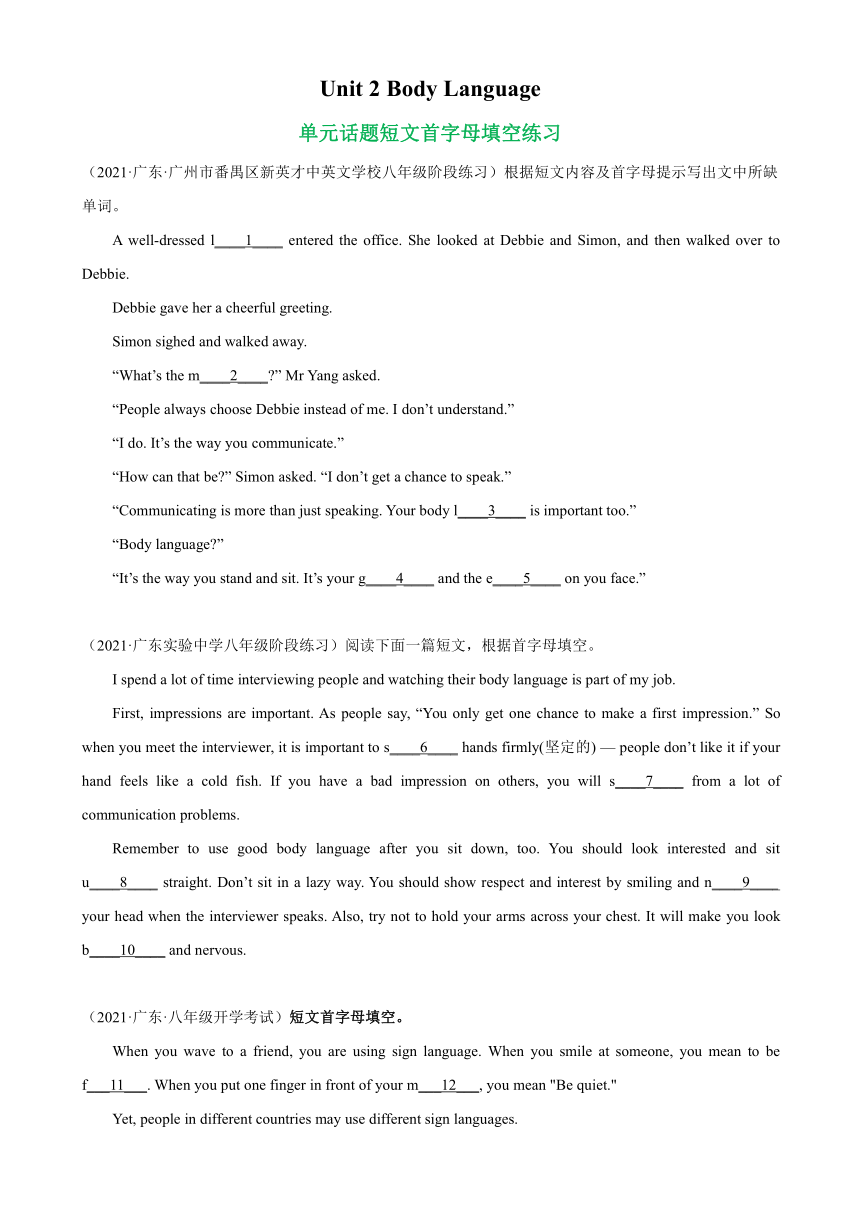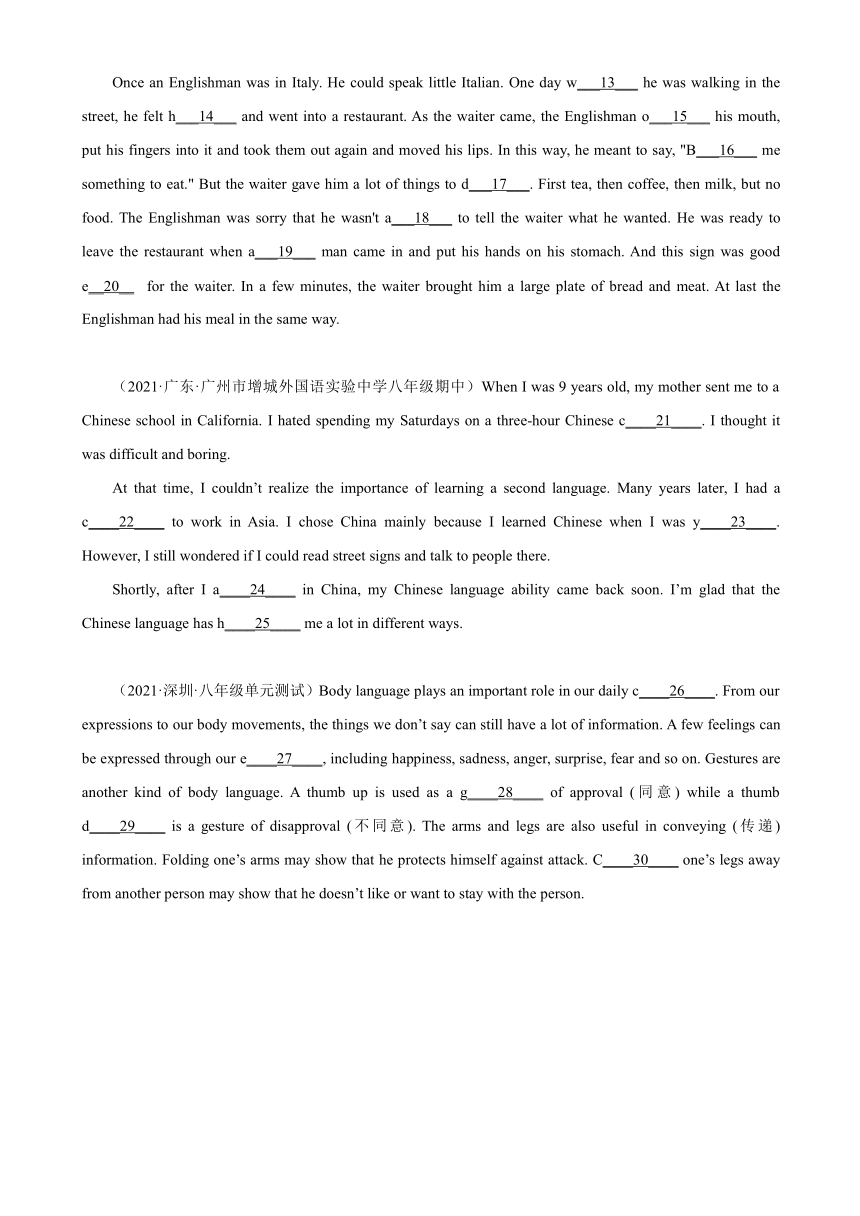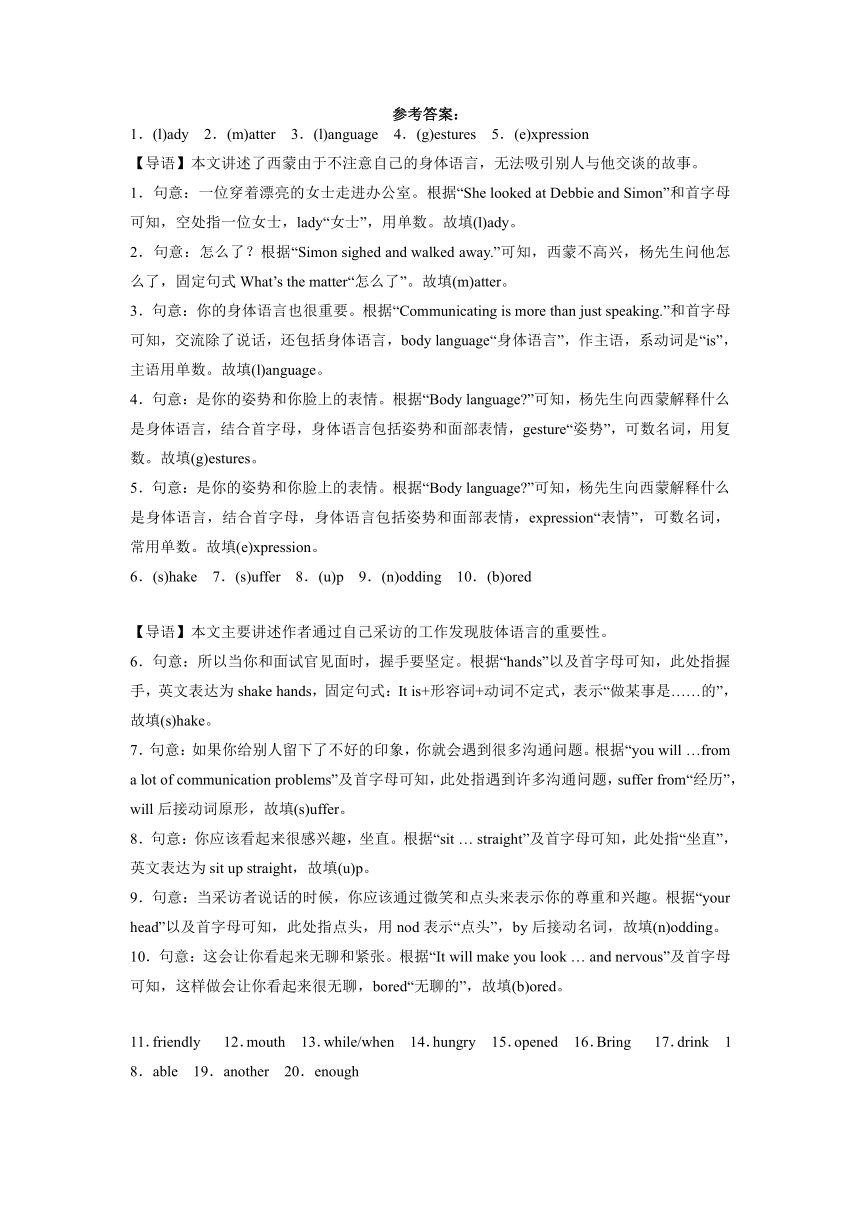Unit 2 单元话题短文首字母填空练习-2022-2023学年八年级英语下册单元重难点易错题精练((含解析))
文档属性
| 名称 | Unit 2 单元话题短文首字母填空练习-2022-2023学年八年级英语下册单元重难点易错题精练((含解析)) |  | |
| 格式 | docx | ||
| 文件大小 | 21.3KB | ||
| 资源类型 | 教案 | ||
| 版本资源 | 牛津深圳版 | ||
| 科目 | 英语 | ||
| 更新时间 | 2023-03-28 13:48:11 | ||
图片预览



文档简介
Unit 2 Body Language
单元话题短文首字母填空练习
(2021·广东·广州市番禺区新英才中英文学校八年级阶段练习)根据短文内容及首字母提示写出文中所缺单词。
A well-dressed l____1____ entered the office. She looked at Debbie and Simon, and then walked over to Debbie.
Debbie gave her a cheerful greeting.
Simon sighed and walked away.
“What’s the m____2____ ” Mr Yang asked.
“People always choose Debbie instead of me. I don’t understand.”
“I do. It’s the way you communicate.”
“How can that be ” Simon asked. “I don’t get a chance to speak.”
“Communicating is more than just speaking. Your body l____3____ is important too.”
“Body language ”
“It’s the way you stand and sit. It’s your g____4____ and the e____5____ on you face.”
(2021·广东实验中学八年级阶段练习)阅读下面一篇短文,根据首字母填空。
I spend a lot of time interviewing people and watching their body language is part of my job.
First, impressions are important. As people say, “You only get one chance to make a first impression.” So when you meet the interviewer, it is important to s____6____ hands firmly(坚定的) — people don’t like it if your hand feels like a cold fish. If you have a bad impression on others, you will s____7____ from a lot of communication problems.
Remember to use good body language after you sit down, too. You should look interested and sit u____8____ straight. Don’t sit in a lazy way. You should show respect and interest by smiling and n____9____ your head when the interviewer speaks. Also, try not to hold your arms across your chest. It will make you look b____10____ and nervous.
(2021·广东·八年级开学考试)短文首字母填空。
When you wave to a friend, you are using sign language. When you smile at someone, you mean to be f___11___. When you put one finger in front of your m___12___, you mean "Be quiet."
Yet, people in different countries may use different sign languages.
Once an Englishman was in Italy. He could speak little Italian. One day w___13___ he was walking in the street, he felt h___14___ and went into a restaurant. As the waiter came, the Englishman o___15___ his mouth, put his fingers into it and took them out again and moved his lips. In this way, he meant to say, "B___16___ me something to eat." But the waiter gave him a lot of things to d___17___. First tea, then coffee, then milk, but no food. The Englishman was sorry that he wasn't a___18___ to tell the waiter what he wanted. He was ready to leave the restaurant when a___19___ man came in and put his hands on his stomach. And this sign was good e__20__ for the waiter. In a few minutes, the waiter brought him a large plate of bread and meat. At last the Englishman had his meal in the same way.
(2021·广东·广州市增城外国语实验中学八年级期中)When I was 9 years old, my mother sent me to a Chinese school in California. I hated spending my Saturdays on a three-hour Chinese c____21____. I thought it was difficult and boring.
At that time, I couldn’t realize the importance of learning a second language. Many years later, I had a c____22____ to work in Asia. I chose China mainly because I learned Chinese when I was y____23____. However, I still wondered if I could read street signs and talk to people there.
Shortly, after I a____24____ in China, my Chinese language ability came back soon. I’m glad that the Chinese language has h____25____ me a lot in different ways.
(2021·深圳·八年级单元测试)Body language plays an important role in our daily c____26____. From our expressions to our body movements, the things we don’t say can still have a lot of information. A few feelings can be expressed through our e____27____, including happiness, sadness, anger, surprise, fear and so on. Gestures are another kind of body language. A thumb up is used as a g____28____ of approval (同意) while a thumb d____29____ is a gesture of disapproval (不同意). The arms and legs are also useful in conveying (传递) information. Folding one’s arms may show that he protects himself against attack. C____30____ one’s legs away from another person may show that he doesn’t like or want to stay with the person.
参考答案:
1.(l)ady 2.(m)atter 3.(l)anguage 4.(g)estures 5.(e)xpression
【导语】本文讲述了西蒙由于不注意自己的身体语言,无法吸引别人与他交谈的故事。
1.句意:一位穿着漂亮的女士走进办公室。根据“She looked at Debbie and Simon”和首字母可知,空处指一位女士,lady“女士”,用单数。故填(l)ady。
2.句意:怎么了?根据“Simon sighed and walked away.”可知,西蒙不高兴,杨先生问他怎么了,固定句式What’s the matter“怎么了”。故填(m)atter。
3.句意:你的身体语言也很重要。根据“Communicating is more than just speaking.”和首字母可知,交流除了说话,还包括身体语言,body language“身体语言”,作主语,系动词是“is”,主语用单数。故填(l)anguage。
4.句意:是你的姿势和你脸上的表情。根据“Body language ”可知,杨先生向西蒙解释什么是身体语言,结合首字母,身体语言包括姿势和面部表情,gesture“姿势”,可数名词,用复数。故填(g)estures。
5.句意:是你的姿势和你脸上的表情。根据“Body language ”可知,杨先生向西蒙解释什么是身体语言,结合首字母,身体语言包括姿势和面部表情,expression“表情”,可数名词,常用单数。故填(e)xpression。
6.(s)hake 7.(s)uffer 8.(u)p 9.(n)odding 10.(b)ored
【导语】本文主要讲述作者通过自己采访的工作发现肢体语言的重要性。
6.句意:所以当你和面试官见面时,握手要坚定。根据“hands”以及首字母可知,此处指握手,英文表达为shake hands,固定句式:It is+形容词+动词不定式,表示“做某事是……的”,故填(s)hake。
7.句意:如果你给别人留下了不好的印象,你就会遇到很多沟通问题。根据“you will …from a lot of communication problems”及首字母可知,此处指遇到许多沟通问题,suffer from“经历”,will后接动词原形,故填(s)uffer。
8.句意:你应该看起来很感兴趣,坐直。根据“sit … straight”及首字母可知,此处指“坐直”,英文表达为sit up straight,故填(u)p。
9.句意:当采访者说话的时候,你应该通过微笑和点头来表示你的尊重和兴趣。根据“your head”以及首字母可知,此处指点头,用nod表示“点头”,by后接动名词,故填(n)odding。
10.句意:这会让你看起来无聊和紧张。根据“It will make you look … and nervous”及首字母可知,这样做会让你看起来很无聊,bored“无聊的”,故填(b)ored。
11.friendly 12.mouth 13.while/when 14.hungry 15.opened 16.Bring 17.drink 18.able 19.another 20.enough
【分析】文章通过一个英国人在印度餐馆吃饭的例子,来讲述了不同的国家有不同的肢体语言。
11.句意:当你对某个人微笑,你意为着是友好的。friendly友好的,根据句意和首字母故填friendly
12.句意:当你把你的手指放在你的嘴的前面,你意思是请安静。mouth嘴,根据句意和首字母故填mouth
13.句意:一天当他在街上走的时候,他感到很饿走进一家餐馆。while/when当---时候;根据句意和首字母故填while/when
14.句意:一天当他在街上走的时候,他感到很饿走进一家餐馆。hungry 饿的,根据 went into a restaurant. 可知是饿的,根据句意和首字母故填hungry
15.句意:这个英国人张开他的嘴。open 张开,根据put his fingers into it and took them out again可知是张开,根据文章可知是过去时态;根据句意和首字母故填opened
16.句意:他的意思是说给我带些吃的过来。bring带来,祈使句用动词原形;根据句意和首字母故填Bring
17.句意:但是服务员给他很多喝的东西。根据First tea, then coffee, then milk,可知是喝的东西;根据句意和首字母故填drink
18.句意:这个英国人不能告诉服务员他想要什么感到很难过。be able to能,根据句意和首字母故填able
19.句意:当他正准备离开餐馆时,另一个人进来把手放到胃上。another另一个,接名词单数;根据句意和首字母故填another
20.句意:这个手势对服务员来说足够明白。enough足够的,修饰形容词时放在形容词后面;根据句意和首字母故填 enough 点睛:enough可以是形容词,也是副词;做副词时可以修饰形容词或副词,放在形容词/副词后面,例如:good enough,fast enough;做形容词可以修饰名词,放在名词前,例如:enough time。
21.(c)ourse 22.(c)hance 23.(y)oung 24.(a)rrived 25.(h)elped
【导语】本文主要介绍了作者在很小时学习了汉语,并在以后工作中给予了作者很大帮助。
21.句意:我讨厌周六花三个小时在汉语课上。根据“I hated spending my Saturdays on a three-hour Chinese c…”可知,此处指汉语课,course“课程”,结合空前的“a”可知,此处使用名词单数。故填(c)ourse。
22.句意:许多年后,我有机会在亚洲工作。根据“Many years later, I had a c…to work in Asia. I chose China mainly because I learned Chinese”可知,此处指有机会在亚洲工作,chance“机会”,a+名词单数。故填(c)hance。
23.句意:我选择中国主要是因为我年轻时学过汉语。根据“When I was 9 years old, my mother sent me to a Chinese school in California. I hated spending my Saturdays on a three-hour Chinese c…”可知,应该是年轻时学过汉语,young“年轻的”,形容词作表语。故填(y)oung。
24.句意:在我到达中国后不久,我的汉语能力很快恢复了。根据“Shortly, after I a…in China, my Chinese language ability came back soon.”可知,此处指到达,arrive in“到达”,本句为一般过去时,使用动词过去式。故填(a)rrived。
25.句意:我很高兴汉语在不同方面帮助了我很多。根据“I’m glad that the Chinese language has h…me a lot in different ways.”可知,此处帮助了我很多,help“帮助”,空前has为现在完成时的助动词,此处使用动词过去分词。故填(h)elped。
26.communication 27.expressions 28.gesture 29.down 30.Crossing
【分析】本文主要介绍了肢体语言在日常交流中的重要作用。
26.句意:肢体语言在我们的日常交流中起着重要的作用。根据首字母c及“Body language”可知,肢体语言在我们的交流中有很重要的作用;communication“交流”,不可数名词。故填communication。
27.句意:我们的表情可以表达一些情感,包括快乐、悲伤、愤怒、惊讶、恐惧等等。根据首字母e及“happiness, sadness, anger, surprise, fear”可知,快乐、悲伤等情绪是可以通过我们的表情来表达的;expression“表情”,可数名词;由“A few feelings”可知,此处指不止一种表情,故用其复数形式。故填expressions。
28.句意:大拇指向上是表示赞同的手势,而大拇指向下是表示反对的手势。根据首字母g及“a…of approval…a gesture of disapproval”可知,大拇指向上是一种表示赞同的手势;gesture“手势”;a gesture of“一种……手势”。故填gesture。
29.句意:大拇指向上是表示赞同的手势,而大拇指向下是表示反对的手势。根据首字母d及“A thumb up is used as a gesture of approval”可知,大拇指向上表示赞同,那么大拇指向下表示不赞同;down“向下”,副词。故填down。
30.句意:把一个人的双腿交叉离开另一个人可能表明他不喜欢或不想和这个人待在一起。根据首字母c及“he doesn’t like or want to stay with the person”可知,此处指交叉双腿表示不喜欢某人;cross“交叉”,动词;此处用动名词作主语;句首首字母大写。故填Crossing。
31.with 32.meet 33.hands 34.correct##right 35.or
【分析】本文介绍肢体语言在全世界都很流行。人们用手、头和眼睛“说话”。日本人见面时会鞠躬。当泰国人见面时,他们把手放在一起。当英国人和美国人第一次见到某人时会握手。当你对某人微笑时,你的意思是“我想变得友好。”当你在课堂上举手的时候,也许你在说,“我想我知道正确的答案”。通常,警察会举起手来拦住汽车或公共汽车。
31.句意:人们用手、头和眼睛“说话”。根据上文“Body language is popular all over the world.”可知是用手、头和眼睛“说话”,空格处填“使用”,with“使用”,介词,表示用“工具、手段等”,故填with。
32.句意:当泰国人见面时,他们把手放在一起。根据上文“When Japanese people meet, they bow.”可知是泰国人见面时,空格处填“见面”,meet“见面”,故meet。
33.句意:当英国人和美国人第一次见到某人时,他们会握手。根据常识和“shake”可知英国人和美国人第一次见到某人时会握手,shake hands“握手”,固定短语,故填hands。
34.句意:我想我知道正确的答案。根据上文“When you put up your hand in class, maybe you are saying,”可知是知道正确的答案,空格处填“正确的”,correct/ right“正确的”,故填correct/ right。
35.句意:通常,警察会举起手来拦住汽车或公共汽车。此句表示选择关系,由常识和“stop a car...a bus”可知拦住汽车或公共汽车,or“或者”,表示选择关系,故填or。
单元话题短文首字母填空练习
(2021·广东·广州市番禺区新英才中英文学校八年级阶段练习)根据短文内容及首字母提示写出文中所缺单词。
A well-dressed l____1____ entered the office. She looked at Debbie and Simon, and then walked over to Debbie.
Debbie gave her a cheerful greeting.
Simon sighed and walked away.
“What’s the m____2____ ” Mr Yang asked.
“People always choose Debbie instead of me. I don’t understand.”
“I do. It’s the way you communicate.”
“How can that be ” Simon asked. “I don’t get a chance to speak.”
“Communicating is more than just speaking. Your body l____3____ is important too.”
“Body language ”
“It’s the way you stand and sit. It’s your g____4____ and the e____5____ on you face.”
(2021·广东实验中学八年级阶段练习)阅读下面一篇短文,根据首字母填空。
I spend a lot of time interviewing people and watching their body language is part of my job.
First, impressions are important. As people say, “You only get one chance to make a first impression.” So when you meet the interviewer, it is important to s____6____ hands firmly(坚定的) — people don’t like it if your hand feels like a cold fish. If you have a bad impression on others, you will s____7____ from a lot of communication problems.
Remember to use good body language after you sit down, too. You should look interested and sit u____8____ straight. Don’t sit in a lazy way. You should show respect and interest by smiling and n____9____ your head when the interviewer speaks. Also, try not to hold your arms across your chest. It will make you look b____10____ and nervous.
(2021·广东·八年级开学考试)短文首字母填空。
When you wave to a friend, you are using sign language. When you smile at someone, you mean to be f___11___. When you put one finger in front of your m___12___, you mean "Be quiet."
Yet, people in different countries may use different sign languages.
Once an Englishman was in Italy. He could speak little Italian. One day w___13___ he was walking in the street, he felt h___14___ and went into a restaurant. As the waiter came, the Englishman o___15___ his mouth, put his fingers into it and took them out again and moved his lips. In this way, he meant to say, "B___16___ me something to eat." But the waiter gave him a lot of things to d___17___. First tea, then coffee, then milk, but no food. The Englishman was sorry that he wasn't a___18___ to tell the waiter what he wanted. He was ready to leave the restaurant when a___19___ man came in and put his hands on his stomach. And this sign was good e__20__ for the waiter. In a few minutes, the waiter brought him a large plate of bread and meat. At last the Englishman had his meal in the same way.
(2021·广东·广州市增城外国语实验中学八年级期中)When I was 9 years old, my mother sent me to a Chinese school in California. I hated spending my Saturdays on a three-hour Chinese c____21____. I thought it was difficult and boring.
At that time, I couldn’t realize the importance of learning a second language. Many years later, I had a c____22____ to work in Asia. I chose China mainly because I learned Chinese when I was y____23____. However, I still wondered if I could read street signs and talk to people there.
Shortly, after I a____24____ in China, my Chinese language ability came back soon. I’m glad that the Chinese language has h____25____ me a lot in different ways.
(2021·深圳·八年级单元测试)Body language plays an important role in our daily c____26____. From our expressions to our body movements, the things we don’t say can still have a lot of information. A few feelings can be expressed through our e____27____, including happiness, sadness, anger, surprise, fear and so on. Gestures are another kind of body language. A thumb up is used as a g____28____ of approval (同意) while a thumb d____29____ is a gesture of disapproval (不同意). The arms and legs are also useful in conveying (传递) information. Folding one’s arms may show that he protects himself against attack. C____30____ one’s legs away from another person may show that he doesn’t like or want to stay with the person.
参考答案:
1.(l)ady 2.(m)atter 3.(l)anguage 4.(g)estures 5.(e)xpression
【导语】本文讲述了西蒙由于不注意自己的身体语言,无法吸引别人与他交谈的故事。
1.句意:一位穿着漂亮的女士走进办公室。根据“She looked at Debbie and Simon”和首字母可知,空处指一位女士,lady“女士”,用单数。故填(l)ady。
2.句意:怎么了?根据“Simon sighed and walked away.”可知,西蒙不高兴,杨先生问他怎么了,固定句式What’s the matter“怎么了”。故填(m)atter。
3.句意:你的身体语言也很重要。根据“Communicating is more than just speaking.”和首字母可知,交流除了说话,还包括身体语言,body language“身体语言”,作主语,系动词是“is”,主语用单数。故填(l)anguage。
4.句意:是你的姿势和你脸上的表情。根据“Body language ”可知,杨先生向西蒙解释什么是身体语言,结合首字母,身体语言包括姿势和面部表情,gesture“姿势”,可数名词,用复数。故填(g)estures。
5.句意:是你的姿势和你脸上的表情。根据“Body language ”可知,杨先生向西蒙解释什么是身体语言,结合首字母,身体语言包括姿势和面部表情,expression“表情”,可数名词,常用单数。故填(e)xpression。
6.(s)hake 7.(s)uffer 8.(u)p 9.(n)odding 10.(b)ored
【导语】本文主要讲述作者通过自己采访的工作发现肢体语言的重要性。
6.句意:所以当你和面试官见面时,握手要坚定。根据“hands”以及首字母可知,此处指握手,英文表达为shake hands,固定句式:It is+形容词+动词不定式,表示“做某事是……的”,故填(s)hake。
7.句意:如果你给别人留下了不好的印象,你就会遇到很多沟通问题。根据“you will …from a lot of communication problems”及首字母可知,此处指遇到许多沟通问题,suffer from“经历”,will后接动词原形,故填(s)uffer。
8.句意:你应该看起来很感兴趣,坐直。根据“sit … straight”及首字母可知,此处指“坐直”,英文表达为sit up straight,故填(u)p。
9.句意:当采访者说话的时候,你应该通过微笑和点头来表示你的尊重和兴趣。根据“your head”以及首字母可知,此处指点头,用nod表示“点头”,by后接动名词,故填(n)odding。
10.句意:这会让你看起来无聊和紧张。根据“It will make you look … and nervous”及首字母可知,这样做会让你看起来很无聊,bored“无聊的”,故填(b)ored。
11.friendly 12.mouth 13.while/when 14.hungry 15.opened 16.Bring 17.drink 18.able 19.another 20.enough
【分析】文章通过一个英国人在印度餐馆吃饭的例子,来讲述了不同的国家有不同的肢体语言。
11.句意:当你对某个人微笑,你意为着是友好的。friendly友好的,根据句意和首字母故填friendly
12.句意:当你把你的手指放在你的嘴的前面,你意思是请安静。mouth嘴,根据句意和首字母故填mouth
13.句意:一天当他在街上走的时候,他感到很饿走进一家餐馆。while/when当---时候;根据句意和首字母故填while/when
14.句意:一天当他在街上走的时候,他感到很饿走进一家餐馆。hungry 饿的,根据 went into a restaurant. 可知是饿的,根据句意和首字母故填hungry
15.句意:这个英国人张开他的嘴。open 张开,根据put his fingers into it and took them out again可知是张开,根据文章可知是过去时态;根据句意和首字母故填opened
16.句意:他的意思是说给我带些吃的过来。bring带来,祈使句用动词原形;根据句意和首字母故填Bring
17.句意:但是服务员给他很多喝的东西。根据First tea, then coffee, then milk,可知是喝的东西;根据句意和首字母故填drink
18.句意:这个英国人不能告诉服务员他想要什么感到很难过。be able to能,根据句意和首字母故填able
19.句意:当他正准备离开餐馆时,另一个人进来把手放到胃上。another另一个,接名词单数;根据句意和首字母故填another
20.句意:这个手势对服务员来说足够明白。enough足够的,修饰形容词时放在形容词后面;根据句意和首字母故填 enough 点睛:enough可以是形容词,也是副词;做副词时可以修饰形容词或副词,放在形容词/副词后面,例如:good enough,fast enough;做形容词可以修饰名词,放在名词前,例如:enough time。
21.(c)ourse 22.(c)hance 23.(y)oung 24.(a)rrived 25.(h)elped
【导语】本文主要介绍了作者在很小时学习了汉语,并在以后工作中给予了作者很大帮助。
21.句意:我讨厌周六花三个小时在汉语课上。根据“I hated spending my Saturdays on a three-hour Chinese c…”可知,此处指汉语课,course“课程”,结合空前的“a”可知,此处使用名词单数。故填(c)ourse。
22.句意:许多年后,我有机会在亚洲工作。根据“Many years later, I had a c…to work in Asia. I chose China mainly because I learned Chinese”可知,此处指有机会在亚洲工作,chance“机会”,a+名词单数。故填(c)hance。
23.句意:我选择中国主要是因为我年轻时学过汉语。根据“When I was 9 years old, my mother sent me to a Chinese school in California. I hated spending my Saturdays on a three-hour Chinese c…”可知,应该是年轻时学过汉语,young“年轻的”,形容词作表语。故填(y)oung。
24.句意:在我到达中国后不久,我的汉语能力很快恢复了。根据“Shortly, after I a…in China, my Chinese language ability came back soon.”可知,此处指到达,arrive in“到达”,本句为一般过去时,使用动词过去式。故填(a)rrived。
25.句意:我很高兴汉语在不同方面帮助了我很多。根据“I’m glad that the Chinese language has h…me a lot in different ways.”可知,此处帮助了我很多,help“帮助”,空前has为现在完成时的助动词,此处使用动词过去分词。故填(h)elped。
26.communication 27.expressions 28.gesture 29.down 30.Crossing
【分析】本文主要介绍了肢体语言在日常交流中的重要作用。
26.句意:肢体语言在我们的日常交流中起着重要的作用。根据首字母c及“Body language”可知,肢体语言在我们的交流中有很重要的作用;communication“交流”,不可数名词。故填communication。
27.句意:我们的表情可以表达一些情感,包括快乐、悲伤、愤怒、惊讶、恐惧等等。根据首字母e及“happiness, sadness, anger, surprise, fear”可知,快乐、悲伤等情绪是可以通过我们的表情来表达的;expression“表情”,可数名词;由“A few feelings”可知,此处指不止一种表情,故用其复数形式。故填expressions。
28.句意:大拇指向上是表示赞同的手势,而大拇指向下是表示反对的手势。根据首字母g及“a…of approval…a gesture of disapproval”可知,大拇指向上是一种表示赞同的手势;gesture“手势”;a gesture of“一种……手势”。故填gesture。
29.句意:大拇指向上是表示赞同的手势,而大拇指向下是表示反对的手势。根据首字母d及“A thumb up is used as a gesture of approval”可知,大拇指向上表示赞同,那么大拇指向下表示不赞同;down“向下”,副词。故填down。
30.句意:把一个人的双腿交叉离开另一个人可能表明他不喜欢或不想和这个人待在一起。根据首字母c及“he doesn’t like or want to stay with the person”可知,此处指交叉双腿表示不喜欢某人;cross“交叉”,动词;此处用动名词作主语;句首首字母大写。故填Crossing。
31.with 32.meet 33.hands 34.correct##right 35.or
【分析】本文介绍肢体语言在全世界都很流行。人们用手、头和眼睛“说话”。日本人见面时会鞠躬。当泰国人见面时,他们把手放在一起。当英国人和美国人第一次见到某人时会握手。当你对某人微笑时,你的意思是“我想变得友好。”当你在课堂上举手的时候,也许你在说,“我想我知道正确的答案”。通常,警察会举起手来拦住汽车或公共汽车。
31.句意:人们用手、头和眼睛“说话”。根据上文“Body language is popular all over the world.”可知是用手、头和眼睛“说话”,空格处填“使用”,with“使用”,介词,表示用“工具、手段等”,故填with。
32.句意:当泰国人见面时,他们把手放在一起。根据上文“When Japanese people meet, they bow.”可知是泰国人见面时,空格处填“见面”,meet“见面”,故meet。
33.句意:当英国人和美国人第一次见到某人时,他们会握手。根据常识和“shake”可知英国人和美国人第一次见到某人时会握手,shake hands“握手”,固定短语,故填hands。
34.句意:我想我知道正确的答案。根据上文“When you put up your hand in class, maybe you are saying,”可知是知道正确的答案,空格处填“正确的”,correct/ right“正确的”,故填correct/ right。
35.句意:通常,警察会举起手来拦住汽车或公共汽车。此句表示选择关系,由常识和“stop a car...a bus”可知拦住汽车或公共汽车,or“或者”,表示选择关系,故填or。
同课章节目录
